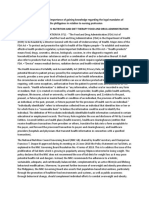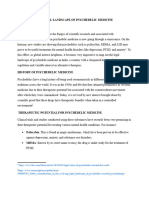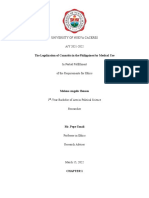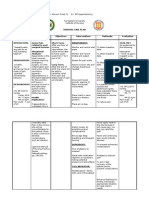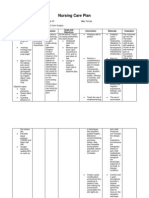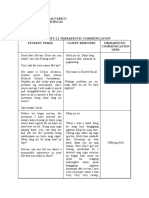Australia Reclassifies Psychedelics To Facilitate Medical Use, As Advocates Push For Similar Move in US - Endpoints News
Australia Reclassifies Psychedelics To Facilitate Medical Use, As Advocates Push For Similar Move in US - Endpoints News
Uploaded by
Sunil Kumar AggarwalOriginal Title
Copyright
Available Formats
Share this document
Did you find this document useful?
Is this content inappropriate?
Report this DocumentCopyright:
Available Formats
Australia Reclassifies Psychedelics To Facilitate Medical Use, As Advocates Push For Similar Move in US - Endpoints News
Australia Reclassifies Psychedelics To Facilitate Medical Use, As Advocates Push For Similar Move in US - Endpoints News
Uploaded by
Sunil Kumar AggarwalCopyright:
Available Formats
July 5, 2023 04:00 PM EDT
R&D, Pharma
Australia reclassifies psy-
chedelics to facilitate med-
ical use, as advocates push
for similar move in US
Nicole DeFeudis
Editor
Australia’s Therapeutic Goods Administra-
tion (TGA) has reclassified two psychedelic
substances to facilitate their use as medi-
cines for certain mental health conditions,
a move that some advocates say could
serve as an example for the US.
Australia announced in February that
starting July 1, authorized psychiatrists can
prescribe drugs containing psilocybin, an
active substance in “magic mushrooms,”
and MDMA for treatment-resistant depres-
sion and post-traumatic stress disorder, re-
spectively. Those are the only two condi-
tions for which TGA has said there is “cur-
rently su!cient evidence for potential ben-
efits.”
Psilocybin and MDMA will be reclassified
as Schedule 8, or controlled drugs, for
those uses and remain as Schedule 9-pro-
hibited substances in all other circum-
stances.
advertisement
advertisement
While there are currently no TGA-ap-
proved medicines containing psilocybin or
MDMA, the agency said these changes will
“allow authorised psychiatrists to access
and legally supply a specified ‘unapproved’
medicine containing these substances to
patients under their care for these specific
uses.”
Psilocybin is currently under development
by a variety of companies for conditions
such as PTSD and treatment-resistant de-
pression, while MDMA has been similarly
studied in PTSD and anxiety in terminally
ill patients.
RELATED: Inside the race to make psychedelics
'mainstream medicines'
In the US, a suite of activists, drugmakers
and policymakers has advocated for the re-
classification of psilocybin and MDMA,
which are currently Schedule I substances,
meaning they have “no currently accepted
medical use and a high potential for
abuse.” The Controlled Substances Act was
enacted in 1970 separating substances into
five schedules, with Schedule I being the
most serious.
Sens. Cory Booker (D-NJ) and Rand Paul
(R-KY) introduced a bill in November
which would allow the federal Drug En-
forcement Administration to make the nec-
essary findings to reclassify therapies such
as MDMA or psilocybin as Schedule II
drugs, which are still characterized as hav-
ing a high risk of abuse, though they in-
clude medicines such as OxyContin and
Dilaudid.
RELATED: Congress takes another look at re-
classifying psilocybin and MDMA
When it comes to clinical
trial design, MindMed
CEO Robert Barrow said
controlled substance reg-
ulations impose “an addi-
Robert Barrow tional barrier on top of an
already extremely rigor-
ous process.” His compa-
ny’s lead product, a pharmacologically op-
timized formation of LSD, is currently in a
Phase IIb trial for generalized anxiety dis-
order.
“I think there’s a very di"erent, clear dis-
tinction between rescheduling a drug in or-
der to facilitate its use and rescheduling it
to facilitate its clinical research,” he said.
Reclassifying certain therapies that contain
Schedule I substances would “help facili-
tate a phased rollout of these potentially
lifesaving therapies via FDA-approved Ex-
panded Access pilot programs,” the sena-
tors said in November, and remove “regula-
tory red tape and a series of bureaucratic
hurdles,” Booker added.
Seattle doctor and Univer-
sity of Washington profes-
sor Sunil Aggarwal took
the fight to change psilo-
cybin’s CSA status to fed-
eral court last year. When Sunil Aggarwal
he previously asked the
DEA to reclassify psilocy-
bin as a Schedule II substance, the agency
responded that the FDA “has not articulat-
ed any accepted medical use” for the drug.
In October, he petitioned the Ninth Circuit
Court of Appeals to review the DEA’s deci-
sion, which remains ongoing.
“It’s just onerous,” Aggarwal told End-
points News on Wednesday. “You can man-
age diversion and all those things without
all that, just the same way we do with THC
pills, which is Schedule III, or ketamine,
which is Schedule III.”
Two weeks ago, the FDA released new
draft guidance on conducting clinical re-
search with psychedelics such as psilocy-
bin, which acknowledged that designing
clinical studies to evaluate their safety and
e!cacy “presents several unique chal-
lenges.”
AUTHOR
Nicole DeFeudis
Editor
nicole@endpointsnews.com
@Nicole_DeFeudis
Nicole DeFeudis on LinkedIn
MORE LIKE THIS
Genentech yanks Gavreto's rare thyroid cancer
indication, months before handing it back to
Blueprint
July 6, 2023
Aslan touts data for competitor to Dupixent as
it seeks new partners
July 6, 2023
Pfizer invests $25M into Caribou Biosciences,
gets first dibs on off-the-shelf CAR-T therapy
for multiple myeloma
July 6, 2023
Bioscience & Technology Business Center
The University of Kansas
Lawrence, Kansas
latest
All News
Special
In Focus
channels
AI Letters to the Editor
Bioregnum Manufacturing
Biotech Voices Marketing
Cell/Gene Tx Opinion
China Outsourcing
Coronavirus Peer Review
Deals People
Diagnostics Pharma
Discovery R&D
FDA+ Startups
Financing Weekly
Law
more
Work at Endpoints
Letter to Editors
IPO Tracker
Events
Webinars
Sponsored Posts
Advertise
Endpoints Merch
About Us
Help
work in biotech
Endpoints Careers
© Endpoints News 2023
Help
Advertise
Privacy Policy
You
Business have read 1 out of your 4 free monthly
Model
articles. For unlimited access, upgrade to a
premium plan.
UPGRADE
You might also like
- Legal Mandates Related To Nutrition and Diet Therapy Food and Drug AdministrationDocument4 pagesLegal Mandates Related To Nutrition and Diet Therapy Food and Drug AdministrationEric Suva BacunawaNo ratings yet
- Inside the Cockpit: Navigating the Complexity of Drug Development With Ai and BlockchainFrom EverandInside the Cockpit: Navigating the Complexity of Drug Development With Ai and BlockchainNo ratings yet
- TQM 113Document3 pagesTQM 113Davnor Pdrrmc0% (1)
- Running Head: Physical Activities and Emotional HealthDocument4 pagesRunning Head: Physical Activities and Emotional HealthMo AlhmrNo ratings yet
- Evidence-Based Practice and Nursing ResearchDocument24 pagesEvidence-Based Practice and Nursing ResearchMelody B. Miguel80% (5)
- Personalized Medicine - A Biological Approach To Patient Treatment - FDADocument5 pagesPersonalized Medicine - A Biological Approach To Patient Treatment - FDAAditya DebnathNo ratings yet
- How MDMA and Psilocybin Became Hot Investments - The New York TimesDocument9 pagesHow MDMA and Psilocybin Became Hot Investments - The New York TimesFranNo ratings yet
- Chsaa State - Session 1Document13 pagesChsaa State - Session 1Ihita KataruNo ratings yet
- 03 08 2010 Drugs & Devices Regulatory & Policy Bulletin - President Calls For ADocument7 pages03 08 2010 Drugs & Devices Regulatory & Policy Bulletin - President Calls For AsuryasanNo ratings yet
- Dirty Medicine by Lynne McTaggartDocument4 pagesDirty Medicine by Lynne McTaggartNadia LakomkinaNo ratings yet
- Efn RP 2Document4 pagesEfn RP 2syenaNo ratings yet
- Literature Review On Otc DrugsDocument6 pagesLiterature Review On Otc Drugsafmzsawcpkjfzj100% (1)
- Advancing Drug Safety PDFDocument3 pagesAdvancing Drug Safety PDFjohnNo ratings yet
- From Idea To MarketDocument6 pagesFrom Idea To MarketvictorccNo ratings yet
- Biologics 02 00014 v2Document25 pagesBiologics 02 00014 v2Arthur Girardi CarpanezNo ratings yet
- CHI FDA Report-EmbargoedDocument12 pagesCHI FDA Report-EmbargoedpsehNo ratings yet
- 5 Findings From The First Major Analysis of Medical Pot BenefitsDocument2 pages5 Findings From The First Major Analysis of Medical Pot BenefitsJames BondNo ratings yet
- Psilocybin Study Report Final 022322Document28 pagesPsilocybin Study Report Final 022322Helen BennettNo ratings yet
- 3 - 5 The Drug Development ProcessDocument10 pages3 - 5 The Drug Development Processaghanafissa5No ratings yet
- USP Cannabis Quality Drivers 2Document5 pagesUSP Cannabis Quality Drivers 2CataNo ratings yet
- TMP 8 DE9Document3 pagesTMP 8 DE9FrontiersNo ratings yet
- OxyContin, Prescription Opioid Abuse and Economic MedicalizationDocument14 pagesOxyContin, Prescription Opioid Abuse and Economic MedicalizationCharlotte AgliataNo ratings yet
- Exploring The Drug Development ProcessDocument9 pagesExploring The Drug Development Processs adhikariNo ratings yet
- Week 2: Post-Marketing Regulation of Pharmaceutical Products LearningDocument4 pagesWeek 2: Post-Marketing Regulation of Pharmaceutical Products LearningNics PedrezuelaNo ratings yet
- BEDocument29 pagesBEYogesh BansalNo ratings yet
- Issue Report - Animal TestingDocument7 pagesIssue Report - Animal Testingapi-469611087No ratings yet
- Debut Drug For Rett Syndrome at Edge of ApprovalDocument4 pagesDebut Drug For Rett Syndrome at Edge of ApprovalNeethu Anna StephenNo ratings yet
- Assessing Risk and Return: Personalized Medicine Development and New Innovation ParadigmDocument34 pagesAssessing Risk and Return: Personalized Medicine Development and New Innovation ParadigmThe Ewing Marion Kauffman Foundation100% (1)
- Reading Module 1 - Đ Thành Đ T - 23LT701210 - Class LT23B-1Document14 pagesReading Module 1 - Đ Thành Đ T - 23LT701210 - Class LT23B-1ReginaldNo ratings yet
- Aussie Medical Cannabis ProgramDocument11 pagesAussie Medical Cannabis Programmuhammad.marsoze.hattaNo ratings yet
- Revised Annotated BibliographyDocument16 pagesRevised Annotated BibliographyBailey DeitchNo ratings yet
- The Legal Landscape of Psychedelic MedicineDocument5 pagesThe Legal Landscape of Psychedelic MedicineRavikant JhaNo ratings yet
- Fda Human Drug Review and Approval Basics ModuleDocument8 pagesFda Human Drug Review and Approval Basics ModuleTawfeeq BA AbbadNo ratings yet
- Lectura Sesgos Ensayos ClinicosDocument11 pagesLectura Sesgos Ensayos ClinicosBeth EnriquezNo ratings yet
- Drug Information Bulletin (Electronic) : Drug Information Centre (DIC) Indian Pharmaceutical Association, Bengal BranchDocument4 pagesDrug Information Bulletin (Electronic) : Drug Information Centre (DIC) Indian Pharmaceutical Association, Bengal BranchamritaryaaligarghNo ratings yet
- JCH 12085 PDFDocument4 pagesJCH 12085 PDFdineNo ratings yet
- FDA Could Supplement Bitumen RegulationsDocument4 pagesFDA Could Supplement Bitumen Regulationsp7hhr67zjwNo ratings yet
- FDA Opens The Door To Clinical Use of LSDDocument7 pagesFDA Opens The Door To Clinical Use of LSDtimsmith1081574No ratings yet
- Single-double-phaseIV-drug ApprovalDocument3 pagesSingle-double-phaseIV-drug ApprovalRoma Ann ManahanNo ratings yet
- Research Paper On OxycontinDocument4 pagesResearch Paper On Oxycontinc9r0s69n100% (1)
- Benosa ResearchDocument7 pagesBenosa ResearchAlysa AsidoNo ratings yet
- Examining The Placebo Effect Đã G PDocument40 pagesExamining The Placebo Effect Đã G PNguyên Nguyễn Lê ThảoNo ratings yet
- Pharmaceutical Careers For Doctors in The Uk - October 2017 Copy 2Document24 pagesPharmaceutical Careers For Doctors in The Uk - October 2017 Copy 2max.gdwinNo ratings yet
- CBR A Drug DevelopDocument2 pagesCBR A Drug DevelopAlfieNo ratings yet
- New Drugs and Clinical Trials Rules2018 gsr104 e by Cdsco Its Impact On Babe Studies in India 2167 7689 1000208Document5 pagesNew Drugs and Clinical Trials Rules2018 gsr104 e by Cdsco Its Impact On Babe Studies in India 2167 7689 1000208ParthMairNo ratings yet
- The DEA Position On MarijuanaDocument63 pagesThe DEA Position On MarijuanaBrian HarrisNo ratings yet
- Policy Practice and Regulatory Issues - 2012Document20 pagesPolicy Practice and Regulatory Issues - 2012andirio7486No ratings yet
- The US FDA and Probiotics Regulatory CategorizationDocument4 pagesThe US FDA and Probiotics Regulatory CategorizationBambangNo ratings yet
- Covid Vaccine UpdateDocument2 pagesCovid Vaccine UpdateAlexadnerNo ratings yet
- Prescription PsychologyDocument7 pagesPrescription PsychologyJose LuisNo ratings yet
- Response To Health Canada On Release of Clinical DataDocument14 pagesResponse To Health Canada On Release of Clinical DataTanuj sai kumarNo ratings yet
- Sage Publications, Inc. Science, Technology, & Human ValuesDocument36 pagesSage Publications, Inc. Science, Technology, & Human ValuesJohn JohnsonNo ratings yet
- Regulatory Pathway For "Biosimilar" Products DebatedDocument4 pagesRegulatory Pathway For "Biosimilar" Products DebatedsuryasanNo ratings yet
- Pharmaceutical ManeuversDocument12 pagesPharmaceutical ManeuversGabriela BruNo ratings yet
- An Introduction To The Pharmaceutical IndustryDocument11 pagesAn Introduction To The Pharmaceutical IndustryRaviraj Singh ChandrawatNo ratings yet
- Huang 2013Document12 pagesHuang 2013GusgaraNo ratings yet
- R&W M1Document10 pagesR&W M1ReginaldNo ratings yet
- Modafinil Does Enhance Cognition, Review Finds: Nigel HawkesDocument1 pageModafinil Does Enhance Cognition, Review Finds: Nigel HawkesDan SouzaNo ratings yet
- Drug DVLPMT StgsDocument18 pagesDrug DVLPMT Stgsvinay0717No ratings yet
- Comparative Study of Generic Drug Approval Process in Eu, Usa and China - A ReviewDocument16 pagesComparative Study of Generic Drug Approval Process in Eu, Usa and China - A ReviewTuyến Đặng ThịNo ratings yet
- Minor ProjectDocument53 pagesMinor Projectpatelvraj308No ratings yet
- 5 Horrifying Facts About FDA-Vaccine-Approval-Process-2019Document24 pages5 Horrifying Facts About FDA-Vaccine-Approval-Process-2019Pollyana Furtado Junqueira100% (1)
- The Closure of The MUHC Addiction Psychiatry ProgramDocument2 pagesThe Closure of The MUHC Addiction Psychiatry ProgramAaron DerfelNo ratings yet
- Chapter I Ethico Moral Aspect in Nursing2018Document106 pagesChapter I Ethico Moral Aspect in Nursing2018Prince Mark BadilloNo ratings yet
- COVID-19 Vaccine in Patients With Haematological Disorders British Society For HaematologyDocument10 pagesCOVID-19 Vaccine in Patients With Haematological Disorders British Society For HaematologydrToikNo ratings yet
- Immersion Portfolio 1Document28 pagesImmersion Portfolio 1Louis Archie Dreyfus Perez50% (2)
- Final Community Diagnosis of Tigbi Tiwi AlbayDocument50 pagesFinal Community Diagnosis of Tigbi Tiwi AlbayEduard Espeso Chiong-Gandul Jr.100% (4)
- Maternity and Child Health Nursing Gynaecology Report (Out Patient)Document9 pagesMaternity and Child Health Nursing Gynaecology Report (Out Patient)Faizah AlshehriNo ratings yet
- Hygiene and HealthDocument2 pagesHygiene and HealthMoodaw SoeNo ratings yet
- Lavondra LeDuff - New UpdateDocument3 pagesLavondra LeDuff - New UpdateArun YadavNo ratings yet
- Dr. Maria CVDocument2 pagesDr. Maria CVFaisal BasharatNo ratings yet
- Resume - Kezia WrightDocument2 pagesResume - Kezia Wrightapi-544124811No ratings yet
- Hip StrengtheningDocument1 pageHip Strengtheningapi-282526794No ratings yet
- NCP PainDocument2 pagesNCP PainJun TangonanNo ratings yet
- FC Rad Onc (SA) Part II Past Papers - 2012 Mar 6-5-2014Document4 pagesFC Rad Onc (SA) Part II Past Papers - 2012 Mar 6-5-2014matentenNo ratings yet
- NCPDocument7 pagesNCPCamille Evan YmasaNo ratings yet
- Daftar Pemberian Vaksinasi Covid-19 14-02-2022Document6 pagesDaftar Pemberian Vaksinasi Covid-19 14-02-2022jeketimbilNo ratings yet
- Daftar Barang New Januari 2023Document54 pagesDaftar Barang New Januari 2023SandiNo ratings yet
- First Assurance Provider Panel 2020Document25 pagesFirst Assurance Provider Panel 2020Tony MwangiNo ratings yet
- Gina Danford Fertility Treatment LetterDocument4 pagesGina Danford Fertility Treatment LetterPBS NewsHourNo ratings yet
- Fda 21 CFR 210 PDFDocument2 pagesFda 21 CFR 210 PDFTamikaNo ratings yet
- Miraculous Self Healing Homoeopathic Principals Therapeutics Materia Medica Ajit Singh Barn.05633 2foreword PrefaceDocument8 pagesMiraculous Self Healing Homoeopathic Principals Therapeutics Materia Medica Ajit Singh Barn.05633 2foreword PrefacemoumonaNo ratings yet
- 1 s2.0 S2468912221000316 MainDocument3 pages1 s2.0 S2468912221000316 MainsiskaNo ratings yet
- Postpartum HemorrhageDocument2 pagesPostpartum HemorrhageAr'nyj Pabualan ZaballeroNo ratings yet
- Group 5 Ads452 EthicsDocument16 pagesGroup 5 Ads452 EthicsnuramiraNo ratings yet
- Behavioural Sciences 2023Document190 pagesBehavioural Sciences 2023shahedalamour3No ratings yet
- Christopher CroweDocument2 pagesChristopher CrowepoleatewichNo ratings yet
- Outpatient Continued Stay Review 6316Document2 pagesOutpatient Continued Stay Review 6316Mistor Dupois WilliamsNo ratings yet
- ALVARICO BACAL Geria ActivityDocument9 pagesALVARICO BACAL Geria ActivityMic HaelNo ratings yet
